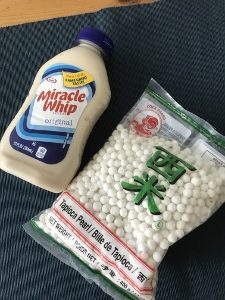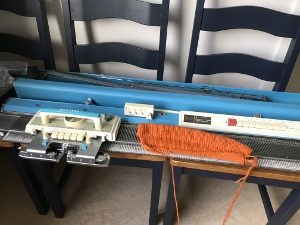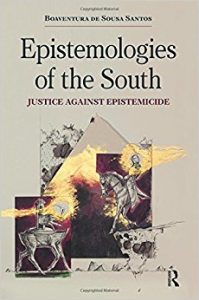The end of the summer always seems to go so fast. The sun is setting earlier now, at 8:30! It seems like last week, it set at 9:30! This gives me a slight sense of dread for the dark (and colder) winters. However, I try to reframe it and remember all the beautiful, long summer days that I’ve enjoyed.
Anya had a last hurrah for the summer and went with a friend to the main amusement park in our area in Stockholm. It is a beautiful location on an island. She had a grand time, and brought back some treats from Stockholm.

Anya first found Miracle Whip (yes, I grew up in the Midwest) at the American store in Stockholm and surprised me for my birthday earlier in the summer. I asked her to pick up another bottle on this trip, not knowing how much it cost. At $9.82 for 12 ounces, I think I’ll switch to mayo! Anya loves bubble tea, so she now has tapioca to try to make her own.
While she was away in Stockholm, I worked at home and went to the gym. I bought a book (Kindle version) that I can’t find in a local library, which I started to read on the exercise bike.
Boaventura de Sousa Santos is calling for not only seeing the validity of other ways of knowing beyond scientific empiricism, but also recognizing that the diverse ways of knowing are a critical asset to integrate with “Western” ways of knowing to more adequately address the challenges of today. He is insightful and provocative in a constructive way. If you have 24 minutes to hear some main points, here’s a link to a YouTube presentation of his from 2012, Spaces of Transformation: Epistemologies of the South.
I’m integrating his viewpoints to challenge the Swedish perspective that biblical studies must be “scientific” in order to be a valid academic discipline. This is “textbook” Modernity, which privileges a historical analysis and dismisses any faith perspective and other “non-rational” approaches. However, as supposedly objective researchers (this is a fallacy) of historical texts in a scientist ethos, there is no ethical dimension to interpretation.
I contrast, I align myself with Elisabeth Schüssler Fiorenza on this issue. In her 1987 Society of Biblical Literature Presidential Address, she writes:
“The reconceptualization of biblical studies in rhetorical rather than scientist terms would provide a research framework not only for integrating historical, archaeological, sociological, literary, and theological approaches as perspectival readings of texts but also for raising ethical-political and religious-theological questions as constitutive of the interpretive process.”
(Elizabeth Schüssler Fiorenza, “The Ethics of Biblical Interpretation: Decentering Biblical Scholarship,” Journal of Biblical Literature 104 (1988): 13.)
That was 40 years ago. So, at the University of Lund next month, I will make a presentation that challenges the exegetical theology approach in Sweden, saying that the international conversation (both Western and Global) has moved a scientist ethos, and ethically, we must too. Furthermore, we would be foolish to limit ourselves from considering other wisdom just because it is not within our established ways of knowing. (I also challenge the perspective that simply using established methodology can determine knowledge, drawing from Naomi Oreskes’ criteria of “consensus,” which most theologians would agree is rare in our disciplines.)
This paper was my major focus yesterday, but I also had a character reference request from one of my former students at Maasai Girls School, the first Maasai woman medical doctor. She needed another reference for an application to a surgical program, in addition to her current supervisor. We have kept in touch over the years. She even traveled with me and my church group last summer for 5 days, as well as our many shorter times together during previous visits. So, I felt I could give an accurate character appraisal. I think she is an amazing young woman, who has wisely and respectfully navigated the transition from a very traditional context (her father doesn’t even speak Kiswahili) to thriving in a modern, urban context. As a teacher, there are some students that you feel privileged to have taught; she is one!
On Friday, Anya was excited to pick up a package at our local grocery store’s mail desk. She bought a used knitting machine (from northern Ireland) on eBay. She had to try it out, which was a bit of distraction from her summer project for the International Baccalaureate program, her extended essay.

With blessings,
Beth

What all can you knit on the machine? Does it have ‘programs’ to tell it what to do? I’m just knitting, scarves usually. That’s my thought level while knitting.